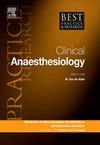风险预测评分在心脏手术患者术前评估中的作用
IF 2.8
3区 医学
Q1 ANESTHESIOLOGY
Best Practice & Research-Clinical Anaesthesiology
Pub Date : 2025-06-01
DOI:10.1016/j.bpa.2025.08.006
引用次数: 0
摘要
术前风险预测评分有助于识别高危患者,指导心脏外科手术决策,并在最终手术前进行优化。在美国,胸外科学会的大型数据库衍生评分系统被用于此目的。STS风险评分不仅对预测死亡率有用,而且对心脏手术后个体器官功能障碍也有用。同样,欧洲国家也使用Euro SCORE来预测心脏手术后的死亡率。除了这两种评分系统外,多器官特异性并发症评分系统也被用于预测发病率(如房颤评分)。有几种虚弱评分系统可用于评估手术后由于年龄相关的总体生理储备下降而导致预后不良的风险。在这篇文章中,我们描述了一些在心脏手术中常用的风险预测评分,以及它们的准确性和缺点。本文章由计算机程序翻译,如有差异,请以英文原文为准。
Role of risk prediction scores in preoperative assessment of cardiac surgical patients
Preoperative risk prediction scores help to identify high risk patients, guide decision making on cardiac surgical procedures and also optimization before definitive surgery. The Society of Thoracic Surgeons large database-derived scoring system is utilized for this purpose in the United States. The STS risk score is not only useful in predicting mortality but also individual organ dysfunction after cardiac surgical procedures. Similarly, Euro SCORE is utilized in European countries to predict mortality after cardiac surgery. Apart from these two scoring systems, multiple organ specific complication scoring systems are being used to predict morbidity (e.g., atrial fibrillation score). Several frailty scoring systems are available to evaluate the risk of poor outcomes due to age-related decline in overall physiological reserve after surgery. In this article, we describe some of the commonly used risk prediction scores in cardiac surgery with their accuracy and drawbacks.
求助全文
通过发布文献求助,成功后即可免费获取论文全文。
去求助
来源期刊

Best Practice & Research-Clinical Anaesthesiology
ANESTHESIOLOGY-
自引率
0.00%
发文量
37
审稿时长
36 days
 求助内容:
求助内容: 应助结果提醒方式:
应助结果提醒方式:


